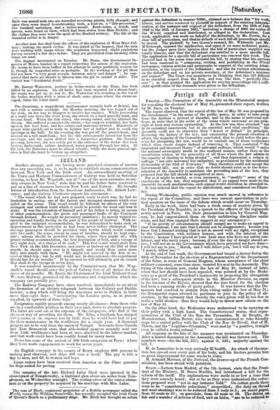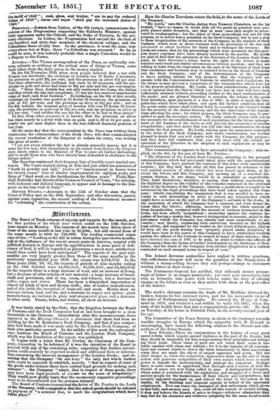Intrigu aush Culunial.
F•sANOE.—The' Committee of the Assembly on the Ministeiial project for repealing the electoral law of May 3-1, presented their report, written by M. Daru, on Tuesday.
The report observed, that the repeal ef the law of Iffay.31 was proposedly the Government ." in the name of the public peace, in order to take awa.y
from the factious a pretext of disorder, and in the name of universal oaf- frage, in order that in the midst of the ruins which surround us one prin- ciple at least may remain upstanding:" As the Jaw was thus attacked not in its secondary enactments but in its essential and vital conditions," the Assembly could not do otherwise than "desert or defend" its principle. Retracing the history of the law, and examining 'the present situation of affairs, the majority (dile Committee concluded, that to yield before the pre- texts for abrogating the law, -would be 'to commit one of those weaknesses which often create danger instead of removing it. They combated " the imprudent and incorrect theory" •of universal suffrage, Which would " make the national sovereignty sonde in 'the confused -masses, rather than as the constitution wishes, in the generality of all those whom the law admits to the capacity of-electing or beings:aeoted".; and they deprecated a return to suffrage".not only universal hut unlimited, as proclaimed by the accidental dictatorship of the 24th of February." They therefore could not ae.irept the Government bill; and in order that no doubt should exist as to the-deter- mination of the Assembly to maintain the pervading idea of the law, they proposed that the bill should be negatived at once.
But as _it might be useful, or even necessary, to "modify" sonic of the enactments of the law, they suggested that if an appeal were made -to the Assembly for such ameliorations, such appeal would doubtless be attended to. It was orderedthat the report be distributed, and considered on Thum- day. During 'Wednesday, public -opinion was 'much moved in reference to the report of the Committee, and there was earnest speculation in poli- tical quarters on 'the issue of 'the debate which would occur on Thursday. - Early in the -week, there 'had been a fresh cause of anxiety given by the President of the Republic, in a spericlito the officers of the regiments newly arrived in Paris. On their presentation to 'him by 'General Mag- ner], he had congratulated Them on their onfaltering discipline under trials, and had'thus engaged their support .any ermegeney-
"If the gravity of -circumstances should compelme to make an appeal to your devotedness, I am sure that I should not be.disappointedi because you know that I demand nothing that is not in accord with my right, recognized by the Constitution, with military honour, and with the interest of the country ; because Shave placed at your head men who have any entire con- fidence, and who merit yours ; because, if ever the day of danger should.ar- rive, I will not do as the Governments which have preceded me have clona- 1 will not say to you, March, and I will _follow you,' but I will say to you I march, follow me.' " At the end of last week, the Government had issued a decree -fixing the 30th of _November for the election of a Representative of the Department of the Seine, in room of General Magnan, whose acceptance of the chief military commmd, some time since, vacated his seat in the Assembly. The fixing of this election now, under the law 'of May 21, instead of later, When that law should have been repealed, -was pchnted at by the Mode- rates as a proof of the President's insincerity in proposing the abrogation of the law • but a subsequent article in the Moniteur Parisien, an organ in the interest of the Elysee, showed that the date fixed for the election had been a cunning stroke of party policy. It was known that the De- mocrats bad resolved to abstain from voting under the law of May 31; the Bonapartist organ advised its partisans to join in the policy of ab- stention, in the certainty that thereby the votes given will be too few to make a valid election.: thus they would help to throw new odium on the law of May 31. On the other hand, the Moderates were understood to he carrying on their policy with a high hand. The Constitationnel states, that repre- sentatives of the Club of the Rue des Pyramides, M. de Broglie, de Montalembert, Odilon Barrot, who -were commissioned to take friendly steps for a united policy with the Club of the Rue de Rivoli, that of M. Thiers, and the "Legifuno-Orleaniets," were metby "a positive, itraight even be called a brutal, refusal."
All suspense on the fate of the measure was terminated on Thursday. After a heated disouriaion in the Assembly, the bill was thrown out. The numbers were—for the:bill, 355; against it, 348; majority against the bill, 7.
M. de Lamartine is in very seriously B1 health. An attack of rheuma- tism has spread over every part of his body, and his doctors promise him no great improvement for some weeks to come.
M. Armand Marrast, of the National, the drawer-up of the Freneh Con- stitution, has been struck with paralysis.
SPAIN.—Letters from Madrid, of the 7th instant, state that the Presi- dent of the Ministry, W. Bravo Murillo, had introduced a bill for the reform of the tariff. His ,explanations were made in so low a tone that they were scarcely heard ; but so far as they were understood the reduc- tions proposed were "not in any instance bold:" On cotton goods there were to be ." considerable reductions," unspecified,; the duty on thread and wool atoekings was to be reduced from 5 reals to 2 ; on uncut paper, from 40 reals to 35 ; on porcelain, from 65 reals to 50. The duties _en fish and a cumber of articles of food, and an hides, ".are to be reduced to the tariff of 1849 ".; coal, ghat, and timber, "are to 'pay the reduced duties of 1849 "; emu& and sugar -"shall pay the increased -ditties of
1849."
Pcorrooar..—Letters from Lisbon, .of 'the 9th instant, communicate the suecess of the Progressietas supporting the Saldanlia Ministry, against tile* opponents under the !Cabrals and the Duke of Terceira, in the pri- mary elections. In Lisbon, the Progressistas had carried the election of onehundred and sixty-four members of the oleotoral colleges, and the Cabralistas these of-only fear. In the provinces, it worn the aame way everywhere but at Bija-; 'there " a leabralista was returned." So far as could be seen, it was scarcely probable that a single Cabraliata would be a Deputy to 'the Cortes.
.Ausrara..—"-The iriannaoorreepondent of the Times, unfrienflly wit- ness, submits as evidence of the critical state of things at Vienna, some fade taken from the daily prices in the money-market. On the flthIleveniber 1850, when most people believed that a war with Prussia was inevitable, the exchange on London was 12 florins 4 kreutzers, the premium en gold 29* per cent, and the premium on silver'21a per cent. Two.days afterwards, the exchange had risen by 52 kreutzers, and the pre- miums on gold and silver'had risen to 321 per oent'and 244 per cent respect- ively. " Since then, Austria has not only eontraeted two loans, the Italian and that whidti she has just -completed ; (?) but the has received considerable sums-of hard cash from Sardinia." Nevertheless, the ,0th of this month, exchange on London was quoted at 12,florins .33 kreutzem, the premium on gold at 31t per cent, and the premium on silver at 241 per cent; and on the 8th instant, the nominal price of London bills was 12 florins 63 kreut- sera, the premium ou gold was at 32} per cent, and the premium on silver at 271 per cent, "and neither the one nor the other to be had at these prices:"
In fact, from other accounts it is known that the premium on silver has risen nearly to a level with that.on gold, and is 30 or al per cent, or nearly ten per taut higher than in the less difficult financial position of last year.
Onthe same day-that the correspondent in the Times was writing these statements, the correspondent of-the Dwi4 News, 'who rcit communicated the recent resolution of the -Emperor to reduce the army, was writing this piece of news —
" I am not aware whether the fact is already generally known, but it is none the less true, that immediately on his return from Galicia the Emperor gave direct orders to the Minister of War to cease all further disbanding, and to recall those men who have alreadybeen disbanded in obedience to the former orders."
The Gazettes continued their frequent lists of terrible court-martial sen- tences. The Court-martial sitting at Este had, just added ten sentences of " death by powder and ball," twelve .of "imprisonment in heavy irons for twenty years;' four of similar imprisonment for -eighteen years, and three of ":hard wonk.on the fortifications for ,fifteen years." Field-ilar- Mall.ltadetzk-y had dissotvedtbeCommonConnc of Como, -"for refusing, with "indecent and disloyal language, to appear and do homage to the Em- peror on hislate visit -to Italy."
BRITISH Ctnewa.—Accounts to the 12th -of October state that the Court of Policy met on the 30th Septeniber, and after discussion, passed, against some opposition, the second reading of the 'Government measure for "reforming" the constitution of the .colony



























 Previous page
Previous page